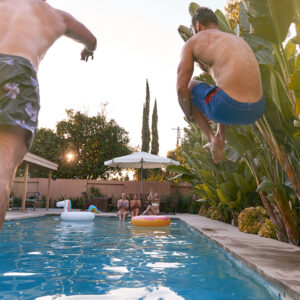There are so many analogies for how we are to engage in this next pandemic transition. We went from denial to fear to terror to fatigue to depression and now… to what?
Transitions are hard by their very nature. We go from something we understand to something different. Depending on our need for control, the uncertainty can feel overwhelming and scary. So how do we embark?
Ask yourself this: If you are staring at a cold pool, are you the type to go in one toe at a time, or do you take the plunge?
There is no “one size fits all.” We’re different in the same way that our practices during COVID varied. For some, going to the grocery store was equivalent to arming ourselves for battle. The virus could be lurking around every corner as we double-masked and wore gloves. Others did the minimum required. Full transparency here—I was a minimalist, never sufficiently nervous as judged by my children. Eventually, their perceptions of risk changed, like many.
All the while, as I was winding down, I had close friends revving up their adherence to “COVID-safe” lifestyles. I understood our differences. One friend, a pediatrician, treated more mentally unwell adolescents in two years than she had in decades of practice. It is wearing to those on the front line, and she will forever earn my appreciation. How could we possibly view COVID the same?
And of course, there are the endless stories of people we either personally know or know of who were affected by COVID. The costs have been high—some due to the illness itself—and others due to the impact of the safety measures.
But isn’t that the point? The costs have been so deep, and we don’t want to continue paying them. So how do we embrace the transition to what we hope will be a return to a new normal? “Normal” is, of course, redefined, but we’ve redefined the word before. After 9/11, we didn’t view travel the same. More rigorous security checks, looking at seemingly abandoned bags with new scrutiny, hearing the words “Let’s roll” were all part of a new take. Our scars will never fully heal.
For many of us, though, taking the plunge into the pool feels like it’s time. It’s time to remind ourselves of what “living” really is. It might just be that I can invite “couples” over for dinner, and not just a single couple who will risk being inside. For a friend of mine, it means she will attend symphonies in person, reveling in the brilliance of the very best musicians playing the very best compositions. Last night the Boston Symphony Orchestra played Mozart’s Piano Concerto No. 17, which provides me more pleasure than a Baskin Robbin’s triple-ice cream cone, though it’s close.
Like everything in life, how we actually undergo the transition matters. It needs to be with respect on all sides. People will need to understand my enthusiasm to head down the road to normal, just as I understand my dear friends’ anxieties about not doing so. People will get to where they get to on their own time. We need to embrace when and how they do it, and if we are lucky, an actual hug might await.
When I told my family that I was writing this column, I was advised not to. “What do you have to say that will matter?” Not much, if I’m honest. But I will leave readers with this thought, which might help the toe-dippers by the pool.
It just might be that while trying to protect the population at large from COVID, we have produced a whole series of unintended consequences that pose a greater societal risk than the damn virus. We have children who have experienced impaired learning. We now know that seeing full faces are needed to teach speech as well as softer skills like reading people. Substance abuse and other metrics of unwellness are off the charts. Seemingly “small” consequences have been reported, such as people driving way too fast to release anger, which has predictably resulted in more traffic fatalities. I could go on, and so could everyone else.
Jumping in the pool just might allow us to begin healing in other areas. Maybe recognizing the unintended costs of adhering to a COVID-safe lifestyle will provide the courage needed to take the plunge. It’s time.

